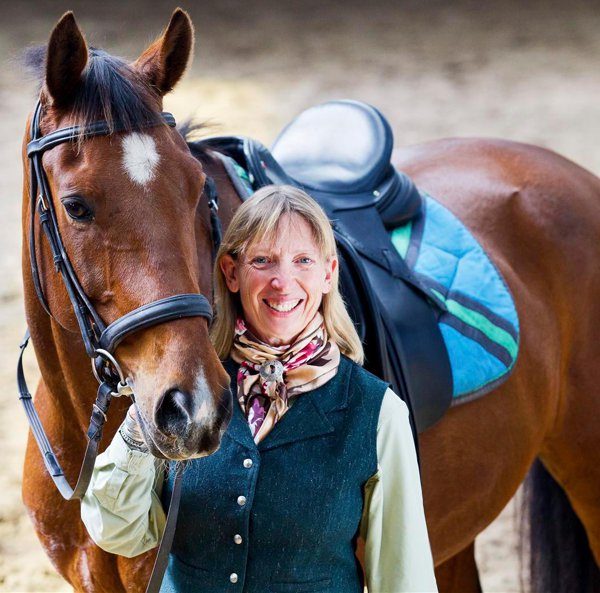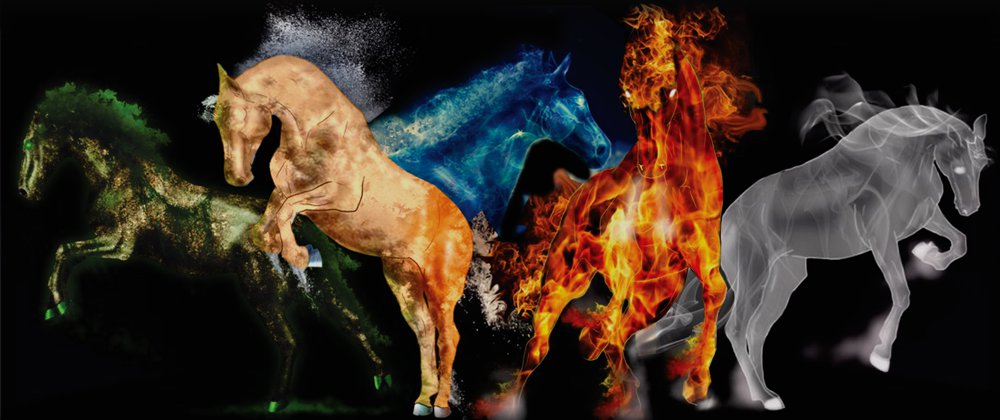Preview Horse Harmony
 Horse Harmony Named Finalist in the the Animals/Pets category of the 2008 Next Generation Indie Book Awards!
Horse Harmony Named Finalist in the the Animals/Pets category of the 2008 Next Generation Indie Book Awards!
Foreword by Wendy Murdoch
Wendy Murdoch is the author of "Simplify Your Riding"
From the moment I looked at the first few pages of Horse Harmony I was thrilled to see that finally someone had put into print what I had been feeling about horses and riders for years: finding the right horse has less to do with selecting a breed or color and more to do with finding a horse with a compatible personality. I immediately began reading about each of the Traditional Chinese Medicine types and thinking about not only my horses but also my clients and their horses. Instantly I could understand what made some relationships work while others were less than harmonious.
For over 20 years I have been teaching riders how to use their bodies to communicate more effectively with their horses. Throughout my career I have seen a large percentage of riders whose personality is mismatched with their horse’s personality. But how do I explain that to the clients? Some owners simply think they have to tough it out and “make the relationship work.” Others are simply intimidated by their equine partners and wind up spending their entire relationship working with them on the ground and feeding them instead of riding.

For over six years I taught a weekly lesson program for a United States Pony Club. As part of my job parents would come to me and ask me to help them find a horse for their child. Or a child would be ready to move up to another horse that became available within the Club. I helped determine if the child/ horse combination would work out as a successful partnership. It became clear to me that I was more than a riding instructor in assisting the match-up of child to horse. I was more like a marriage counselor. I had to take into account the personality of the child, the personality of the horse, and the skill level of both. Unconsciously I was determining if they were a good match, as with a marriage, and how long the relationship would last, since the child would continue to grow and develop. But how could I explain this to the parents? Often times the parents were not riders and had no understanding of the delicacy of matching their child with an equine partner. If only I had had Horse Harmony then! I would have made it required reading for every parent so that they could understand what I meant when I told them a certain horse fit their child. It certainly would have made my life easier.
As I continue to teach all around the world I am fascinated by the choices riders make when selecting a horse partner. When I see a good partnership it is so rewarding because horse and rider trust each other and are happy to work through learning new skills together. Sometimes I find that, while the personalities are a good match, there are some basic communication problems which can be easily resolved by teaching the rider how to ride more effectively. A change in perspective or the removal of a problem such as an illfitting saddle can quickly resolve the misunderstanding, and the trusting partnership is easily restored.
Then there are the horse/rider combinations that are simply not working. Often these riders tell me they love their horse, blame themselves, and think they should be able to work through the problems. Equally often they have been injured because they were not willing to recognize that their horse was just not a good match for them. I often advise these people that if riding is supposed to be fun why put yourself through the torture of a bad marriage? There will be someone else whose personality matches your horse and another horse with the right personality for you.
While I can only try to explain my gut feelings, Horse Harmony puts words and case histories behind each personality type to help riders understand why a relationship is not working, ease the emotional stress when acknowledging incompatible personalities, and give guidance as to what to look for in order to have a good relationship with their horse. Horse Harmony helps you understand why you and your horse are not getting along and what to what to look for so that you can make wiser decisions based on compatibility with your next horse.
Five-Element Type Short Summaries

Fire Horse: The Perfect Show Horse
Fire horses love to be at the center of attention and they want to be adored. They make excellent hunters and dressage horses, as well as good pleasure horses. They need to be told that they are loved. They enjoy grooming and bathing because it makes them beautiful.
Wood Horse: The Ultimate Competitor
Wood horses love physical challenges and must be kept active or they will develop bad habits like kicking and biting. Wood horses make excellent jumpers, barrel racers and cutters so long as they understand the rules of the game. Don’t try to subdue or overpower a Wood horse but instead reason with them.
Earth Horse: The Dependable Lesson Horse
Earth horses love two things: respect and food. They are solid citizens who want to be appreciated for the good work they do, and food treats often go a long way toward keeping them happy. They make perfect school horses and work well with children. They develop bad habits when their daily routine is upset.
Metal Horse: The Hard-Working Ranch Horse
Metal horses enjoy order and control, and can stand up to some of the toughest working conditions. They do their jobs perfectly but otherwise desire very little interaction. They can be found in all disciplines and are often found in working-horse situations like ranching.
Water Horse: The Arab Park Horse
Water horses need safety and a trustworthy rider. They can be brilliant show horses but panic easily. They perform well in events that call for animation and excitement, and are motivated by cheering crowds. They need steady riders to help them through scary situations.
Tai Yin Horse (Yin Earth/Metal): Consistent Hard Worker
The Tai Yin horse often bonds to a single person and will work very hard for that person. They crave respect and routine. They excel in events that call for consistency rather than flash. They tend to be slower moving and have heavier bodies.
Yang Ming Horse (Yang Metal/Earth): Good Horse for Beginners
Yang Ming horses want to be treated fairly. They will withhold respect and affection until they are sure their riders are fair and respectable. They are athletic enough to go into any discipline and often win based on their consistent performance. They tend to have long and lanky bodies.
Shao Yin Horse (Yin Fire/Water): A Good Kid’s Horse
Shao Yin horses like attention and social interaction as well as figuring things out. They are fairly laid back and make excellent western pleasure and trail horses. They have good presence in the show ring but lack the personality to do speed or endurance events. They seem to be the easiest of all types to train.
Tai Yang Horse (Yang Water/Fire)
Tai Yang horses have the highest energy of all the types and they love to show off. They need supportive riders to help them through scary situations and tend to be suspicious of new people. They excel at jumping and endurance and also do well at competitive driving. They need to be taught to relax and thrive on praise.
Jue Yin Horse (Yin Wood/Fire)
Jue Yin horses are highly mercurial and work well only when they want to. Working with these horses can be a real exercise in patience and if they are not “in the mood” to work, it’s best to delay training to another day. These horses do best in low pressure activities such as playdays, trail rides, clinics and schooling shows. Desensitizing them with exposure to flags and tarps can make them much safer to handle.
Shao Yang Horse (Yang Fire/Wood)
Shao Yang horses are the supreme competitors. They are agile, coordinated and athletic, but can take aggressiveness to an extreme. Shao Yang horses need handlers with the same level of will and strength. These horses excel at racing, cross country, stadium jumping, reining and cutting, but lack the focus to do dressage, pleasure or hunter classes.